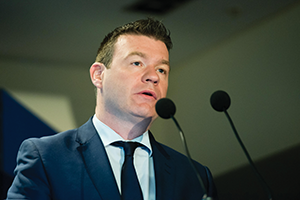Kelly restates Government commitment to water reform proposals
The Minister for the Environment, Community and Local Government, Alan Kelly TD, has recently re-stated the government’s commitment to its water reform proposals and has declared himself satisfied with the “extremely good start” made by Irish Water.
The Minister’s robust defence of water reform comes at a time when the Government’s proposed water charges are coming under constant political attack with some observers predicting a Government climb-down on what could be a potentially difficult issue for the coalition parties facing into next year’s general election.
Rationale for proposed reforms
Earlier, in a speech entitled ‘Future directions for Water Policy’ delivered on 17 June of this year, Minister Kelly set out the broad rationale for the governments reforms: Firstly, Ireland’s water infrastructure had not been adequately funded over many years as it had had to compete (unsuccessfully) against priorities such as health and education for its share of the budget. As a result, the water system was now at full capacity and up to 1 million people were dependent on drinking water at risk of failing to meet the required standard. There was now a need for substantial urgent investment.
Secondly, water infrastructure had been managed by a multiplicity of local authorities who, despite working hard, had been unable to take a strategic overview of water infrastructure and plan investment accordingly. This inefficient management structure also failed to raise adequate finance for investment or capture economies of scale including the benefits of centralised procurement.
There was therefore an unanswerable case for a new national water authority, now Irish Water. Also a strong case for a body that would not be dependent for its income on a share of general taxation, but which could raise its own finance to cover operating costs and increase investment. Thus the necessary introduction of water charges.
Water Framework Directive
Minister Kelly pointed out that successive Governments down the years had underinvested in Ireland’s water infrastructure and the wake-up call had really only come with the passing of the EU Water Framework Directive. (WFD) The WFD required Ireland to protect and improve water quality in all waters so that favourable ecological status was attained. There was the requirement that water quality actually focused on the entire water system, from source to the sea, and that a series of River Basin Management Plans should be prepared to support this approach.
The Minister pointed out that the second round of River Basin Management Plans were now under discussion and should be finalised and in place by the beginning of 2017. He argued that much could be learned from the first round of plans in the area of governance and coordination and the identification of key issues.
Consultation on significant water management issues
As the first part of the River Basin Management Plan process was to identify the key issues in a particular basin district, Minister Kelly used the occasion of his policy speech to announce a public consultation on a new discussion document entitled ‘Significant Water Management Issues in Ireland’. The paper, prepared by the Department of the Environment in conjunction with the EPA, and described by Kelly as “our best assessment of the key pressures and factors affecting Ireland’s water” was aimed at achieving a ‘broad consensus’ on the issues so that the right measures could be designed to address them. The consultation would end in December 2015.
Central to the consultation document, amid all the technical detail, was a key emphasis on collaborative working between the various players in the water sector and genuine engagement with stakeholders. Another key theme highlighted by the Minister was ‘Integrated Catchment Management’ which involved bringing together policy, research and community action at local level to develop a real shared understanding of the challenges facing individual catchments. This would make it possible to agree specific actions and to implement them locally.
New WFD Governance Structure
The Minister also outlined the new approach to governance in the context of implementing the Water Framework Directive, “The new arrangement assigns clear roles and responsibilities to my Department, the EPA and to local authorities and this new three-tiered approach provides for better coordination between strategic oversight, scientific input and local engagement functions.”
Essentially strategic oversight would come from the Department assisted by the National Water Policy Advisory Committee (already established), the EPA would lead on the scientific input at tier 2 of the new structure and local authorities would lead on tier 3, public engagement. As regards the public engagement a new spatially dispersed national office would be established to assist local authorities in this function and with WFD implementation generally. The Minister also announced that following a bidding process the new national office would have Tipperary and Kilkenny Councils, jointly, as its ‘lead local authority’. Minister Kelly concluded his June ‘policy direction’ speech on an optimistic note, stating that with everyone “working together” the goals of the WFD could be achieved.
Still many challenges ahead
However, even since Kelly’s June speech new challenges have continued to emerge for the water reform programme: In late July, EU statistics agency Eurostat classified Irish Water as still effectively being on the Government’s balance sheet – an outcome which could have a very unhelpful impact on the Government’s overall fiscal arithmetic. Although acknowledging this setback, the Environment Minister remains confident that Ireland’s Central Statistics Office (CSO) will persuade Eurostat to change their assessment and eventually reclassify Irish Water as off balance sheet.
Irish Water has also been facing difficulty in transitioning local authority water staff into the new national body. It is believed by some commentators that the job security guarantees that Irish Water has had to give these staff in order to secure smooth transition, has been overly expensive and has undermined the enhanced cost performance previously targeted by the company.
Alongside that, after the nationwide issuance of the bills for the new Irish Water charges some months ago, it has been revealed that only 46 per cent of people have actually paid. Again Kelly pointed out that this figure, which he was “hugely delighted with” compared favourably with the payment compliance record which followed the introduction of the household charge and also compared favourably with the introduction of utility charges in some parts of Britain.
Kelly further emphasised that those who didn’t pay would face penalties and that eventually they would pay “one way or the other” and he castigated those who were encouraging people not to pay, saying that non payers will find that “they have been led up the garden path.”
As regards the proposition from outright opponents of water charges, that the Government would be forced ultimately to dismantle the new utility, Kelly was unflinching…“The concept of having Irish Water is here for good.”






